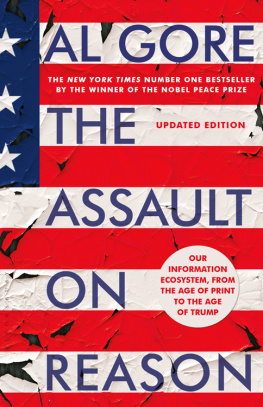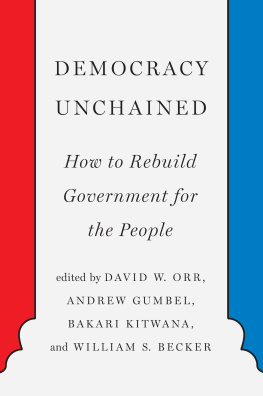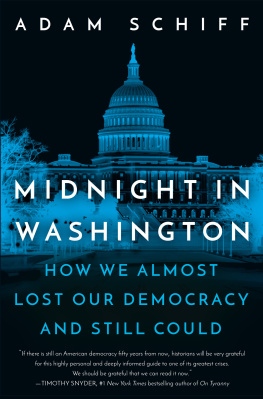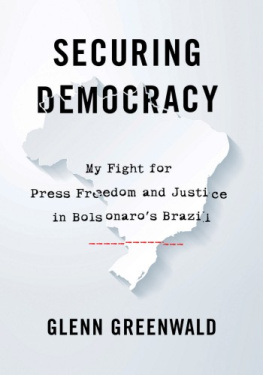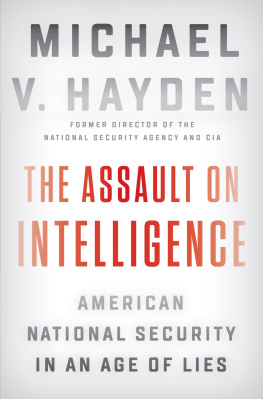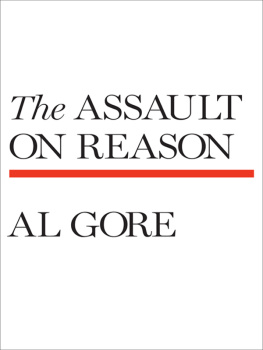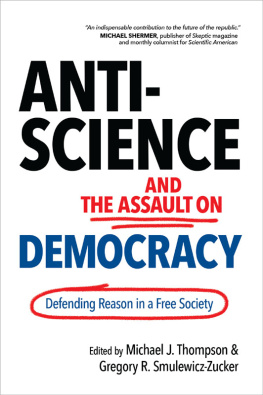
Praise for the First Edition of Al Gores
The Assault on Reason
The Assault on Reason... is as powerful in making its points about the implications of this administrations policies as the authors 2006 book, An Inconvenient Truth, was in making its points about the fallout of global warming.... [A] blistering assessment of the Bush administration and the state of public discourse in America at this fateful juncture in history
New York Times
Powerful... His writing represents a decency and an intelligence in American political thought that has been missing in recent years
Sunday Times
Historians who need a catalog of what went wrong after, oh, December 12, 2000, the day of a certain U.S. Supreme Court decision, will find it all in this book
Washington Post
What [Al Gore] is telling us today with the moral authority of a man who many believe was wrongly barred from the presidency is that American democracy and indeed American society are in danger from authoritarians of the right.... He provides in this book one of the most comprehensive indictments of the Bush administration that has ever appeared in print
Los Angeles Times
The book is part polemic, part impeachment in hard covers
Boston Globe
The book devastating precisely because Gore has been so close to the pinnacle of American politics is a carefully considered elucidation of the Bush administrations crimes
Bloomberg.com
The Assault
on Reason
To my father,
Senator Albert Gore Sr.,
19071998

Ten years ago, when I wrote the first edition of The Assault on Reason, I began with the observation that a large and growing number of Americans are asking out loud: What has happened to our country? More and more people are trying to figure out what has gone wrong in our democracy, and how we can fix it.
Ten years later, especially in the wake of the 2016 presidential campaign, this feeling of unease about our democracy has deepened considerably. The assault on reason has not only continued but intensified. At the end of 2016, , declared surreal as its word of the year.
Back in 20062007, I was extremely concerned that reason was playing a sharply diminished role in the deliberations of representative democracy, and that the time-honored method by which Americans tried to identify the best available evidenceand then struggled together to agree on what was more likely than not to be truewas having an increasingly hard time of it out in the world.
Information that was importantly true, like the scientific consensus on the global emergency of the climate crisis, was simply not finding its way into peoples hearts and mindsin part because of large, expensive, and successful disinformation campaigns. Meanwhile, information that was importantly untrue, such as the allegation that Saddam Hussein was responsible for attacking the United States on 9/11, was actually believed by most Americans, and continued to be believed by nearly half of all Americans five years later, in 2006.
I wrote The Assault on Reason, not to excoriate the bad actors behind the poisoning of our ecosystem of information, but to explore how that ecosystem has changed in ways that make it so much more vulnerable to such poisoning. Bad actors have always been with us, and always will be, and in any case, my bad actor might be your inspired patriot.
For this edition, I have added a substantial new conclusion, which largely uses the 2016 election and the success of Donald Trumps sui generis campaign to try to explain what has happened over the ten years since this book was first written, and to examine where we can go from here.
I admit it doesnt look good. His counselor, Kellyanne Conway, has introduced a new Orwellian label for falsehoods: alternative facts. And even before taking the oath of office, Trump used Twitter to begin a continuing claim that millions of votes in the election were cast fraudulently, despite overwhelming evidence that this isnt so, and absolutely no credible evidence that it is so. His apparent reason is to counter a fear that the mandate he wants attached to his victory in the electoral college might be undermined if too much importance was assigned to the fact that his opponent won the popular vote by a significant margin.
But just as I felt ten years ago that it was too simple, and wrong, to focus on George W. Bush as the cause of this crisis in American democracy, I feel the same way now about Donald J. Trump. Indeed, during his campaign, Trump was a harsh critic of Bushparticularly his decision to ignore the CIAs clear warning in August 2001 that Osama bin Laden was planning to imminently attack the United States, and his misleading claim a year later that Saddam Hussein possessed weapons of mass destruction (WMD). Ironically, Russian propaganda designed to undermine confidence in the ability of the United States to make good decisions regularly includes the question, What about the claim that Iraq had WMD?
I wrote about the Bush administrations relationship to the forces of unreason at a moment when the stakes were still high; the grave consequences of that history are of course still with usparticularly the destabilization of the Middle East and the Eastern Mediterranean that predictably followed the tragic invasion of Iraq on false pretenses.
Now that some of those passions have cooled, I have been tempted to go back to those sections of the book and recalibrate them. I have resisted that temptation: I think the essential argument of these sections has held up well, and they serve as case studies of abiding use. And in terms of the underlying issues, the stakes are still just as high.
This is, truly, a deepening systemic crisis for American self-government and for democracy itself. After all, Trumps victory must be seen in the context of a worldwide rise in support for right-wing populism and authoritarianism. And in every country that has voted in anger to overturn the established order, reason itself has been under assault.
Just a few weeks after the election, here in the United States, his weapon in a Washington, D.C., pizzeria because of baseless and vicious online conspiracy theories advanced by Internet trolls supporting Trump (or that simply hated Hillary Clinton) that the restaurant was the site of a child pornography ring run by Clinton campaign head John Podesta. And the same group has already started circulating claims that this gunman was himself a false flagthat is, a plantsent by the child pornographers themselves to discredit the conspiracy theories. This is, of course, a level of detachment from reality that is truly disturbing.
Almost every day now, there are similar examples of fake news, ludicrous conspiracy theories and determined efforts to discredit the established truth of information that in previous eras would have been challenged among the literate and sane. But perhaps more important than the proliferation of fake news are the decline of real news about actual and important choices confronting our self-government and called disinformation, which in his view does not mean false information. It means misleading informationmisplaced, irrelevant, fragmented or superficial informationinformation that creates the illusion of knowing something but which in fact leads one away from knowing. Postman believed that when everything is presented as entertainment, the role of news for self-government is damaged, because we are losing our sense of what it means to be well informed.
Next page
